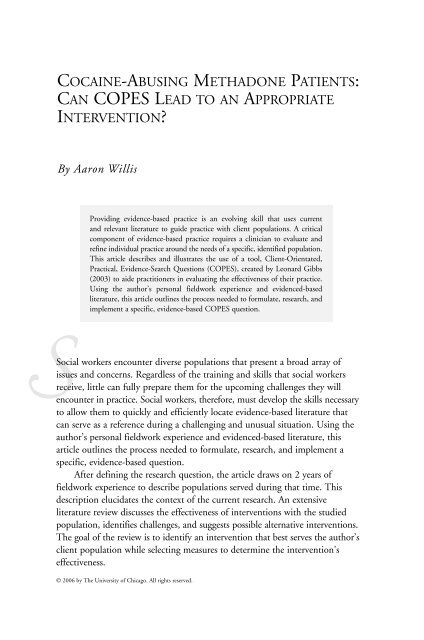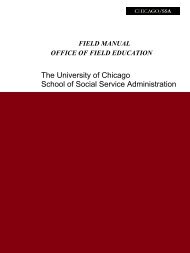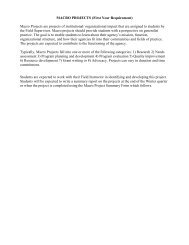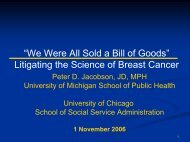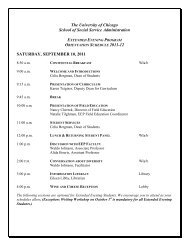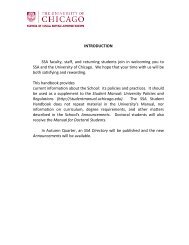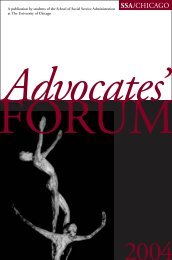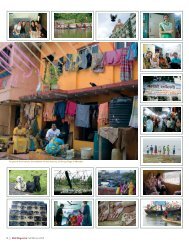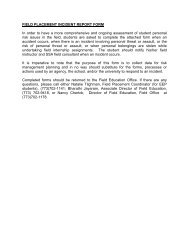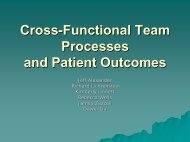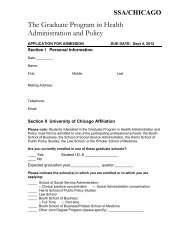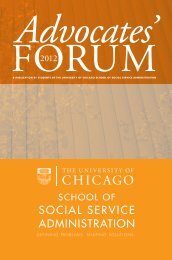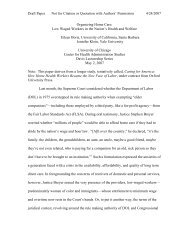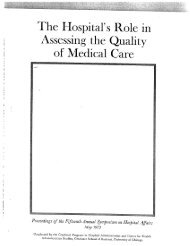2006 - School of Social Service Administration - University of Chicago
2006 - School of Social Service Administration - University of Chicago
2006 - School of Social Service Administration - University of Chicago
You also want an ePaper? Increase the reach of your titles
YUMPU automatically turns print PDFs into web optimized ePapers that Google loves.
COCAINE-ABUSING METHADONE PATIENTS:<br />
CAN COPES LEAD TO AN APPROPRIATE<br />
INTERVENTION?<br />
By Aaron Willis<br />
Providing evidence-based practice is an evolving skill that uses current<br />
and relevant literature to guide practice with client populations. A critical<br />
component <strong>of</strong> evidence-based practice requires a clinician to evaluate and<br />
refine individual practice around the needs <strong>of</strong> a specific, identified population.<br />
This article describes and illustrates the use <strong>of</strong> a tool, Client-Orientated,<br />
Practical, Evidence-Search Questions (COPES), created by Leonard Gibbs<br />
(2003) to aide practitioners in evaluating the effectiveness <strong>of</strong> their practice.<br />
Using the author’s personal fieldwork experience and evidenced-based<br />
literature, this article outlines the process needed to formulate, research, and<br />
implement a specific, evidence-based COPES question.<br />
<strong>Social</strong> workers encounter diverse populations that present a broad array <strong>of</strong><br />
issues and concerns. Regardless <strong>of</strong> the training and skills that social workers<br />
receive, little can fully prepare them for the upcoming challenges they will<br />
encounter in practice. <strong>Social</strong> workers, therefore, must develop the skills necessary<br />
to allow them to quickly and efficiently locate evidence-based literature that<br />
can serve as a reference during a challenging and unusual situation. Using the<br />
author’s personal fieldwork experience and evidenced-based literature, this<br />
article outlines the process needed to formulate, research, and implement a<br />
specific, evidence-based question.<br />
After defining the research question, the article draws on 2 years <strong>of</strong><br />
fieldwork experience to describe populations served during that time. This<br />
description elucidates the context <strong>of</strong> the current research. An extensive<br />
literature review discusses the effectiveness <strong>of</strong> interventions with the studied<br />
population, identifies challenges, and suggests possible alternative interventions.<br />
The goal <strong>of</strong> the review is to identify an intervention that best serves the author’s<br />
client population while selecting measures to determine the intervention’s<br />
effectiveness.<br />
© <strong>2006</strong> by The <strong>University</strong> <strong>of</strong> <strong>Chicago</strong>. All rights reserved.


